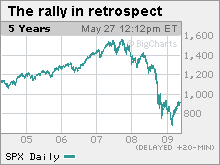Surprise! There are no more surprises
Apparently, Wall Street has factored all bad news into stocks. Is that a good sign, or should investors be worried if something unexpected really happens?

 |
| The S&P 500 has soared since early March on economic recovery hopes. But even if it moves back above 1,000 sometime soon, the index would still be well below its pre-Lehman levels from last fall - not to mention its all-time high from October 2007. |
NEW YORK (CNNMoney.com) -- Now that more economists are willing to declare that the recession will be over by the end of this year, the stunning market rally that started in March makes a little more sense.
After all, there is an old saw on Wall Street that stocks will often move higher before the end of an economic downturn because investors often anticipate the beginning of a recovery by a couple of months.
Nonetheless, it is amazing how market sentiment has reversed so dramatically in such a short period of time. It wasn't that long ago that every bit of bad news was treated as further evidence of impending economic annihilation, and anything that seemed like good news was dismissed as a mere statistical anomaly.
Still, the bad news hasn't necessarily gone away. The economy may be showing signs of improvement but it's not yet healthy. None of that seems to be a concern though.
GM (GM, Fortune 500) going bankrupt? It's priced in. More declines in housing prices and rising unemployment. It's discounted. Swine flu? Been there, done that. North Korea missile launches? Yawn. Skynet becoming self-aware so it can enslave humanity? Ok. Maybe the plot of "Terminator: Salvation" is not priced into the market. Yet.
In all seriousness, it is encouraging that investors may have finally become so used to bad news that it no longer fazes them.
"There is the potential for more volatility but many of the surprises are gone," said Gregg S. Fisher, chief investment officer with Gerstein Fisher, a financial advisory firm in New York with about $1 billion of assets that deals predominantly with individual investors ."The markets are anticipating so much negative news already that it would take an awful lot to shock the system."
That new attitude is healthy. But is it overly optimistic? Perhaps.
Talkback: Is the worst really over for the economy or is there more bad news to come? Leave your comments at the bottom of this story.
Then again, one could argue that the market's move since March isn't necessarily a case of irrational exuberance run amok. Instead, it may be a needed correction that is moving the market back up where we belong - apologies for the reference to the awful Joe Cocker-Jennifer Warnes duet from "An Officer and a Gentleman" - instead of down.
Stocks may simply be returning to more normal levels since the worst-case scenarios that bears had in mind following the collapse of Lehman Brothers in September have not panned out.
"This isn't as much a rally as a reverse from the plunge based on Depression fears that now seem to be off the table," said Doug MacKay, chief investment officer of Broadleaf Partners, a money management firm based in Hudson, Ohio. "When people complain about a rally it's because they didn't participate. So people look to poke holes in it."
Now don't get me wrong. I agree that the events of the past few months will hopefully put the talk of Great Depression 2 to rest. But that does not mean there is no longer anything to worry about.
I've written about several concerns for consumers and investors in the past few months, such as potential problems for banks with commercial real estate loans and rising fears about the weakening dollar and surging oil prices.
Still, MacKay said that as long as the next few rounds of economic reports, as well as corporate earnings results for the second quarter that will start to be released in July, confirm that the economy is no longer deteriorating rapidly, that will probably be enough to keep the rally going.
With that in mind, he thinks that the S&P 500 could wind up going as high as 1,100 before the end of the year. That's about 20% higher than current levels.
But to put that in perspective, that's 12% below where the benchmark index was before Lehman's implosion and more than 30% below its all-time high of about 1,576 in October 2007.
Still, investors might be okay with the fact that there's a ways to go before we get back to that peak - if we ever do. The renewed sense of confidence could be an indication that people have moved on to the final phase in the proverbial seven stages of grief: acceptance.
Instead of pining for the glory days of 2006 and 2007 (i.e. when your house and 401(k) were worth a heck of a lot more than they are now) people have nursed their financial wounds so to speak, and are now looking ahead to what's hopefully going to be a less painful future.
"Investors are getting comfortable with a different frame of reference. A few months ago, people were obsessed with when the value of their home would get back to where it was and when their portfolio would get back to where it was," Fisher said.
"Now, people are looking at the markets and economic data and are getting excited about movement from where we are currently," he added.
Talkback: Is the worst really over for the economy or is there more bad news to come? ![]()

